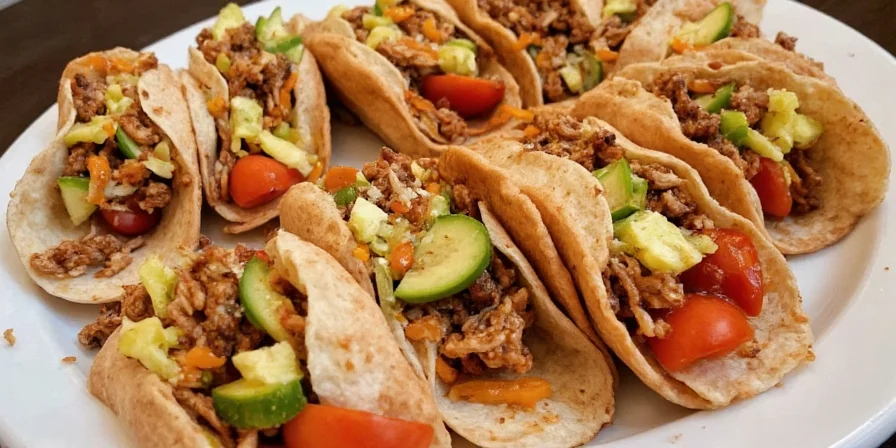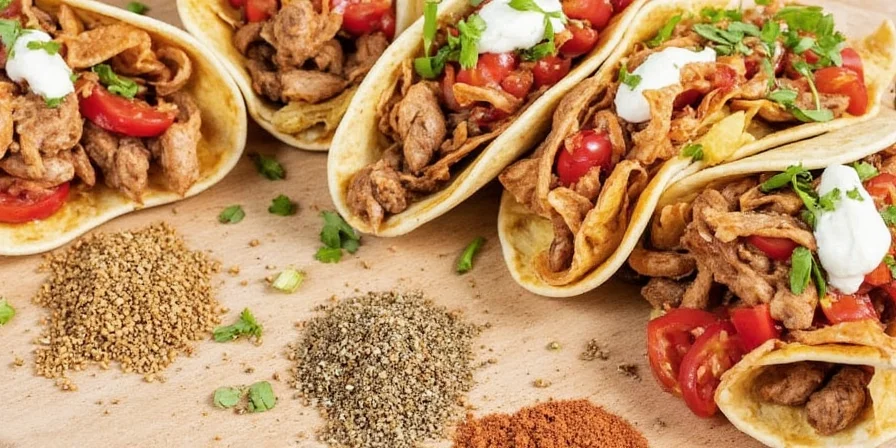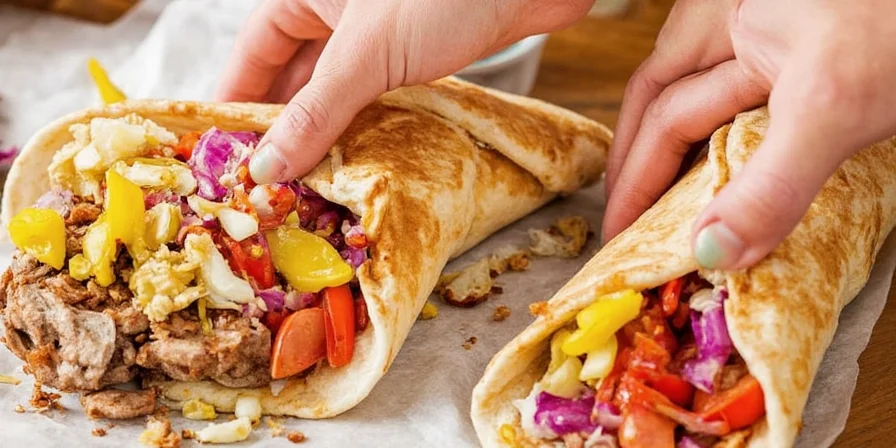Table of Contents
- The 7 Essential Spices Every Authentic Gyro Needs
- Your Complete Guide to Gyro Seasoning Ingredients
- Simple Steps to Perfectly Seasoned Gyro Meat
- 3 Easy Homemade Gyro Spice Blends (Ready in 5 Minutes)
- Traditional Flavor Pairing Tips from Greek Kitchens
- Pro Secrets for Restaurant-Quality Results at Home
- Transform Your Homemade Gyros Forever
- Quick Answers to Your Top Gyro Spice Questions
The 7 Essential Spices Every Authentic Gyro Needs
If you want to make gyros that taste like they came straight from a Greek street vendor, these 7 spices are non-negotiable. Forget complicated chemistry—here's exactly what goes into authentic gyro seasoning, in the right proportions that actually work in your home kitchen.

Photo: Perfectly seasoned gyro meat that's tender and flavorful throughout.
The magic of a great gyro comes from just a handful of spices that have been used in Mediterranean cooking for generations. While many recipes overcomplicate things with hard-to-find ingredients, authentic gyro seasoning uses common spices you probably already have in your pantry. The key isn't rare ingredients—it's using the right spices in the right amounts and applying them properly to your meat. Let's break down exactly what you need.
Your Complete Guide to Gyro Seasoning Ingredients
These 7 spices form the foundation of authentic gyro flavor. Get these right, and you'll never need store-bought seasoning again:
- Oregano: The star of the show. Use Greek oregano (not Italian) for that distinctive earthy, slightly peppery flavor that defines authentic gyros. It's not just tradition—Greek oregano has stronger flavor compounds that stand up to cooking.
- Cumin: Adds warm, nutty depth. Don't skip this—it's what gives gyros that characteristic Mediterranean richness without being overpowering.
- Paprika: Provides vibrant color and subtle sweetness. Use sweet paprika (not smoked) for traditional flavor.
- Garlic Powder: More reliable than fresh garlic in dry rubs—distributes evenly and won't burn during cooking.
- Black Pepper: Freshly ground makes all the difference. Adds brightness that balances the other spices.
- Dill: Essential for chicken gyros. Use dried dill weed for best results in marinades.
- Allspice: The secret weapon. Just a pinch mimics the complex warmth of traditional slow-roasted meats.

Photo: The 7 essential spices for authentic homemade gyro seasoning.
Simple Steps to Perfectly Seasoned Gyro Meat
Getting great flavor isn't just about the spices—it's how you use them. Follow these simple steps for consistently delicious results:
- Measure precisely: Use measuring spoons, not eyeballing. Authentic flavor depends on the right ratios (see our recipes below).
- Marinate properly: For best results, marinate meat for 4-12 hours (not just 30 minutes). This isn't complicated—just mix spices with oil and let your meat soak up the flavor.
- Use oil as your carrier: Always mix spices with olive oil before applying to meat. This helps the spices stick and creates a flavorful crust when cooking.
- Salt separately: Add salt either before marinating or during cooking—never mixed directly with other spices in dry form, as it can draw out moisture too early.
- Reapply during cooking: For thicker cuts, brush on extra spice oil halfway through cooking for maximum flavor penetration.

Photo: Properly marinated gyro meat showing even spice distribution.
3 Easy Homemade Gyro Spice Blends (Ready in 5 Minutes)
Here are three authentic-tasting spice blends that actually work in home kitchens. Each makes enough for 2-3 lbs of meat:
Classic Lamb or Beef Gyro Blend
- 2 tablespoons dried Greek oregano
- 1 tablespoon ground cumin
- 1 tablespoon sweet paprika
- 1 tablespoon garlic powder
- 2 teaspoons freshly ground black pepper
- 1 teaspoon onion powder
- ½ teaspoon ground allspice
- 1½ teaspoons sea salt (add separately)
Mix all spices except salt. Rub mixture into meat with 3 tablespoons olive oil, then add salt. Marinate 4-12 hours.
Perfect Chicken Gyro Blend
- 2 tablespoons dried Greek oregano
- 1 tablespoon dried dill weed
- 1 tablespoon sweet paprika
- 1 tablespoon garlic powder
- 1½ teaspoons onion powder
- 1 teaspoon ground coriander
- ½ teaspoon ground allspice
- 1½ teaspoons sea salt (add separately)
Combine all spices except salt. Mix with 3 tablespoons olive oil before applying to chicken. Marinate 4-8 hours (no longer for chicken).
Simple Vegetarian/Vegan Option
- 2 tablespoons dried Greek oregano
- 1 tablespoon ground cumin
- 1 tablespoon sweet paprika
- 1 tablespoon garlic powder
- 1 teaspoon onion powder
- 1 teaspoon dried mint
- ½ teaspoon ground allspice
- 1½ teaspoons sea salt (add separately)
Combine with 3 tablespoons olive oil. Works perfectly on portobello mushrooms, seitan, or chickpeas. Marinate 2-4 hours.

Photo: Ready-to-use homemade gyro spice blend.
Traditional Flavor Pairing Tips from Greek Kitchens
| Spice | Best For | Right Amount | Pro Tips |
|---|---|---|---|
| Oregano | All meats | 2 parts | Rub between fingers first to release oils |
| Cumin | Lamb/beef | 1 part | Toast lightly for deeper flavor |
| Paprika | All meats | 1 part | Always use sweet, not smoked |
| Garlic Powder | All meats | 1 part | Better than fresh for even distribution |
| Allspice | All meats | ¼ part | Less is more—just a pinch needed |

Photo: Perfectly seasoned gyro with traditional tzatziki sauce.
Pro Secrets for Restaurant-Quality Results at Home
These tips come from Greek chefs and experienced home cooks who've mastered authentic gyro preparation:
- Toast your spices: "Lightly toast whole cumin seeds in a dry pan before grinding. This brings out incredible depth of flavor," recommends Maria Papadopoulos, whose family runs a Chicago gyro shop.
- Oil temperature matters: "Mix spices with room-temperature oil, not hot oil, to prevent burning delicate compounds," advises chef Dimitri Constantin.
- Freshness is key: "Replace dried oregano every 6 months—it loses potency quickly," notes home cooking expert Sarah Kostas.
- Don't over-marinate chicken: "More than 8 hours makes chicken mushy—4-6 hours is perfect," shares food scientist Dr. Elena Torres.
- The squeeze test: "After marinating, gently squeeze the meat—if lots of liquid comes out, you've marinated too long," recommends culinary instructor James Wilson.

Photo: All ingredients ready for authentic homemade gyro assembly.
Transform Your Homemade Gyros Forever
You don't need fancy equipment or rare ingredients to make incredible gyros at home—just the right spices in the right proportions. Forget complicated recipes and confusing science; authentic gyro flavor comes down to mastering these 7 essential spices and using them properly.
Start with our Classic Lamb or Beef Gyro Blend—mix the spices, rub them into your meat with olive oil, and let it marinate overnight. When you taste the results, you'll understand why these simple seasonings have been used for generations in Greek kitchens.
The secret isn't in expensive ingredients or specialized techniques—it's in respecting the traditional spice ratios that create balanced, authentic flavor. Try one of our simple blends this week, and you'll never go back to bland, store-bought seasoning again.
Quick Answers to Your Top Gyro Spice Questions
- What's the most important spice for authentic gyro flavor?
Oregano is the most crucial spice. Use Greek oregano (not Italian) as it has stronger, more authentic flavor. For best results, rub dried oregano between your fingers before using to release the essential oils. - Can I make gyro seasoning without cumin?
While possible, cumin is traditional and adds essential depth. If avoiding cumin, increase oregano by 50% and add a pinch more allspice to compensate for the lost warmth. The flavor won't be quite authentic but will still be delicious. - How long should I marinate gyro meat?
Lamb or beef: 4-12 hours. Chicken: 4-8 hours (no longer, as acid in spices can make it mushy). Never marinate more than 24 hours. For best results, marinate in the refrigerator and turn the meat occasionally. - Why does my homemade gyro taste different than restaurant versions?
Most restaurants use vertical rotisserie cooking, which continuously bastes the meat. At home, brush extra spice oil during cooking and maintain medium heat (325-350°F) to mimic this effect. Also, double-check your oregano quality—many stores sell weak Italian oregano instead of Greek. - Can I use fresh herbs instead of dried in gyro seasoning?
Dried herbs work better in marinades—they're more concentrated and distribute evenly. Use dried oregano and dill. Save fresh herbs for garnish or tzatziki sauce, as heat degrades their delicate flavors during cooking.











 浙公网安备
33010002000092号
浙公网安备
33010002000092号 浙B2-20120091-4
浙B2-20120091-4